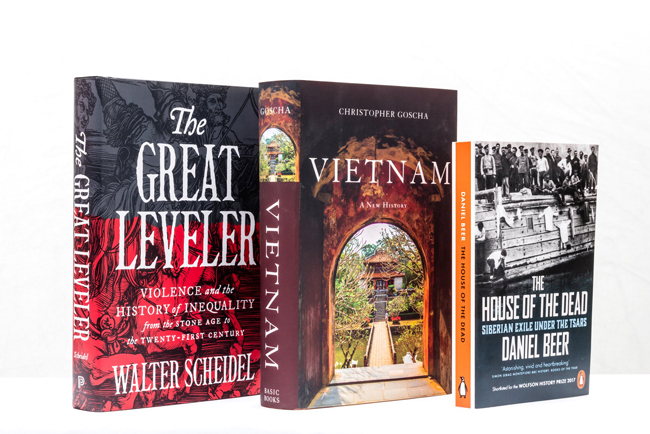
Canadian historian Christopher Goscha has been shortlisted for the international Cundill History Prize. Vietnam: A New History is one of three contenders for the US$75,000 prize, the richest in non-fiction for a single work in English.
Run by McGill, the Cundill History Prize rewards the best history writing in English. The jury of world-class historians and authors has chosen the finalists from a longlist spanning the globe and covering pertinent issues ranging from religion to race relations. The winner will be awarded US$75,000; the two runners-up receive US$10,000 each.
The 2017 finalists are:
- The House of the Dead: Siberian Exile Under the Tsar, by Daniel Beer (Allen Lane)
- Vietnam: A New History, by Christopher Goscha (Basic Books)
- The Great Leveler: Violence and the History of Inequality from the Stone Age to the Twenty-First Century, by Walter Scheidel (Princeton University Press)
“The three finalists for the 2017 Cundill History Prize are extraordinary works of history: beautifully crafted, well-researched, and ambitious,” said historian Margaret MacMillan, Chair of the Jury. “They tackle big issues and help us to know ourselves and our world better. We live in complicated times and the work of historians such as these provides us with the necessary background, understanding and insights to enable us to formulate the sorts of questions we ought to be asking.”
With Vietnam: A New History, Christopher Goscha has written the definitive history of an increasingly influential nation that most have only ever seen through the prism of colonialism and the Vietnam war.
“Christopher Gosha’s Vietnam was a revelation to me,” said jurist Roy Foster, an award-winning Oxford professor. “This is a book that is written from an inside perspective, from somebody who has immersed himself in the sources, learned the languages, studied the cultures and constructed the story of a country, the story of individuals and people, often tragically, often inspiringly.”
The Great Leveler turns Thomas Piketty on its head: the Austrian-born, US-based historian Walter Scheidel uses a sweeping look at history, from the Stone Age to the 21st century, to demonstrate why inequality is so persistent — and unlikely to go away.
“If you are someone who wants more equality in your society, you’re going to hate this book,” said Canadian journalist, author and Cundill jurist Jeffrey Simpson. “Walter Scheidel has backed up a very controversial thesis with an enormous amount of economic data. The Great Leveler is going to be quite unpopular in certain circles, but it is a book that we think you have to grapple with, even if you don’t agree.”
With The House of the Dead, British historian Daniel Beer delivers a ground-breaking new study of how the Tsars turned Siberia into a vast and brutal prison camp.
“The House of the Dead is absolutely marvellous, because it presents a 360° view of history,” said Jury member Amanda Foreman, herself an historian and author. “Daniel Beer has a universality of approach that is both innovative and really important. This is the story of an immense tragedy over hundreds of years. It is a huge canvas, and to be able to bring in individual stories, that sense of what it is to be human, is really a triumph.”
Commenting on the shortlist,UK historian, broadcaster and Cundill jurist Rana Mitter said: “One of the things that is most notable about this shortlist is how extensive, how global the questions that it deals with are. These studies speak to something even beyond the particular subjects that they look at.”
In this, the 10th anniversary of the Cundill History Prize, the Jury chose this year’s contenders from a record 300 submissions.
Previous winners of the Cundill History Prize include Stuart B. Schwartz (2008), Lisa Jardine (2009), Diarmaid MacCulloch (2010), Sergio Luzzatto (2011), Stephen Platt (2012), Anne Applebaum (2013), Gary Bass (2014), Susan Pedersen (2015), and Thomas W. Laqueur (2016).
